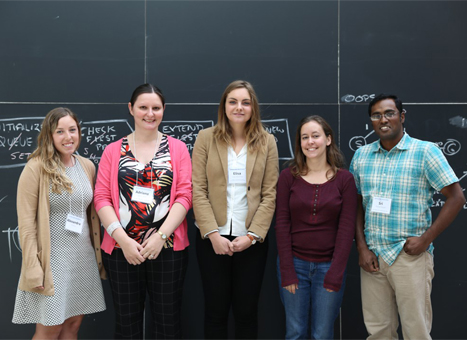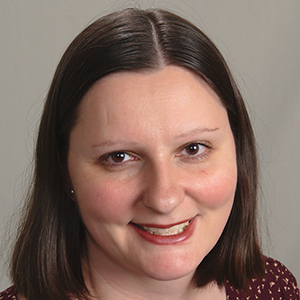From doing science to fixing it
Author’s note: Full disclosure — I don’t yet have a job, but I am using my experience to transition into a different career field. Here, I share what I’ve been through and what I’ve learned along the way. I hope this will save you a bit of time and frustration in your own career transition.
 The author, Adriana Bankson, second from left, is pictured among travel awardees from the 2016 Advocating for Science symposium and workshop at MIT, co-organized by Future of Research and other groups.IMAGE COURTESY OF ALINA CHAN, FUTURE OF RESEARCH
The author, Adriana Bankson, second from left, is pictured among travel awardees from the 2016 Advocating for Science symposium and workshop at MIT, co-organized by Future of Research and other groups.IMAGE COURTESY OF ALINA CHAN, FUTURE OF RESEARCH
Like most of you reading this, I was a typical kid interested in science who majored in biology in college and then went to graduate school. During graduate school, I was engrossed in my science and focused on graduating, so I didn’t take much time to explore career options. I was also pretty convinced that I wanted to stay in academia.
Questions and connections
During my postdoc years, however, I began to question my career choice. I saw my principal investigators struggling to secure grants, constantly stressed out about publications and thinking of ways the lab could save money, all while running their labs, mentoring us and having families. Besides the usual frustration over failed experiments, I came to see the reality of academia from the perspective of other trainees, many of whom felt lost in the system of science and unsure what to do with their careers.
I looked for opportunities to learn what I could do with my Ph.D. At the same time, I felt alone and wanted to connect with postdocs on campus beyond those on my floor. I went to the graduate and postdoctoral office at the University of Louisville for ideas. Unfortunately, there wasn’t much information about postdocs at the university, and postdocs there weren’t really connected with one another. I went back to my lab thinking this was the end of this conversation.
Shortly after this meeting, the associate dean for graduate and postdoctoral studies asked me if I wanted to attend the National Postdoctoral Association meeting that year as the one postdoc they could afford to send. I was honored and excited to attend the meeting, which turned out to be eye-opening.
To my surprise, I realized that there was a much larger community of postdocs out there and that we all shared the same issues. I also realized I had just had a great deal of fun (a word I never really used in the lab!) at the meeting and hadn’t discussed science at all. This refreshing experience planted the idea that maybe my future career was not all about bench science.
Crafting career paths
After the meeting, I started to feel more connected to the postdoc community. I became more concerned with the global question of what we, as postdocs, were going to do with our careers in today’s scientific environment. So I again went to the graduate and postdoctoral office, only this time it was to talk about building something for postdocs to help them find out about and navigate career options.
I learned that another postdoc at the university also was thinking about this issue. I connected with him, and together we started a career seminar series, Career Research Advancement Focused Training, or CRAFT for short, as in “crafting your career path.” Initially, we invited university alumni to talk about their jobs and had a few participants practice their research talks in preparation for conferences. Over time, the series grew into a monthly event with speakers from all over the country in numerous fields.
Trainees told me how much they appreciated the series and that it was giving them information about careers they’d never considered before. I was surprised by how happy it made me to be the person filling in this gap. I realized I was somehow meant to help trainees succeed in their career paths.
I decided to get more involved with the National Postdoctoral Association, in particular with the Resource Development Committee, to see if I could help develop resources to benefit the entire postdoc community. I created several resources and felt very satisfied that I was making a difference at the national level. I am now involved with the NPA Advocacy and Meetings Committees in various capacities.
At the same time, I got involved with the American Society for Cell Biology’s Committee for Postdocs and Students. I organized and moderated career panels, recruited people to write articles, and wrote and edited blog posts about issues of interest to trainees. I also organized ASCB-sponsored symposia to connect trainees in the Midwest and allow them to meet other great scientists working on similar research topics.
New options explored
While all this was fun, there was still the issue of what I would do with my own career. The graduate and postdoctoral office started encouraging trainees to fill out the myIDP and asked that we have discussions about the results with our PIs. As any good academic would do, I took the test.
Being a PI was not at the top of my list from the myIDP (as I expected), but instead what came up were things like science policy (top of the list), research administration and science writing. I had no idea what any of these were and neither did my then-PI. I started reading more about these career options online and looking up people on LinkedIn who worked in these fields. I called them and asked about their jobs and how they had gotten to that point. My network in multiple fields began to grow, and without knowing it, I was also cultivating multiple career options.
Still, even after talking with people about their career paths, how I could actually make the transition happen for myself was still unclear. It seemed like the myIDP test gave me three disjointed options.
This is where some introspection helped. The more I thought about it, the more I realized that there was a common thread throughout all these options, and that was improving the scientific system to help trainees succeed. This meant changing the system for both academics and those who desire nonresearch careers.
At the same time, I felt strange moving entirely away from bench research. But as I neared the end of my second postdoc, I knew I didn’t want to be in academia anymore. I sought to get involved with other groups at the national level that were interested in helping trainees, such as the nonprofit organization Future of Research. FoR’s goal is to change the way we do science by giving a voice to junior scientists, which is also mine! How lucky was I to find exactly what I was looking for in such a short time?
I attended a meeting co-organized by FoR and other groups last September where we discussed problems junior scientists perceived with the scientific system and highlighted skills needed for effective science advocacy.
When ideas converge
At this point, I felt that all my efforts and thoughts toward improving the scientific system finally had found a home in this organization. My volunteer work with FoR led to a number of incredible opportunities to learn more about what trainees need and how I could help address them on a larger scale by running workshops and presenting posters as well as writing blog posts and publishing a paper. All my ideas finally had converged into my career goal: to improve the scientific environment for junior scientists.
Career exploration can be daunting for graduate students and postdocs, who mostly are trained for academia. Luckily for me, persistence and openness to opportunity paid off in finding my perfect career path.
When I started graduate school, I was pipetting away at the bench trying to understand more about skeletal muscle biology. At the time I thought, “This will be my contribution to making the world better.” I never could have imagined then that 10 years later I would be heading down another career path in which I truly can feel fulfilled and happy while helping someone else succeed and helping science advance at the same time.
My own career exploration definitely did not go as planned, but it turned out so much better! As stated in the beginning of this article, I am still figuring out how to navigate this career transition, but here are four things I have learned along the way:
Finding my passion has made it very easy for me to voice my opinions.
Things not going as planned turned out to be a blessing.
Being opportunistic and trying new things have taken me in wonderful new directions.
My ideal career path involves helping people while making an impact at the same time.
Enjoy reading ASBMB Today?
Become a member to receive the print edition four times a year and the digital edition monthly.
Learn moreFeatured jobs
from the ASBMB career center
Get the latest from ASBMB Today
Enter your email address, and we’ll send you a weekly email with recent articles, interviews and more.
Latest in Careers
Careers highlights or most popular articles

From humble beginnings to unlocking lysosomal secrets
Monther Abu–Remaileh will receive the ASBMB’s 2026 Walter A. Shaw Young Investigator Award in Lipid Research at the ASBMB Annual Meeting, March 7-10 in Washington, D.C.

Chemistry meets biology to thwart parasites
Margaret Phillips will receive the Alice and C. C. Wang Award in Molecular Parasitology at the ASBMB Annual Meeting, March 7-10 in Washington, D.C.

Decoding how bacteria flip host’s molecular switches
Kim Orth will receive the Earl and Thressa Stadtman Distinguished Scientists Award at the ASBMB Annual Meeting, March 7–10, just outside of Washington, D.C.

Defining JNKs: Targets for drug discovery
Roger Davis will receive the Bert and Natalie Vallee Award in Biomedical Science at the ASBMB Annual Meeting, March 7–10, just outside of Washington, D.C.

Upcoming opportunities
No matter where you are in your career and what future path you aspire to, everyone needs leadership skills. Join ASBMB for practical strategies for building and practicing leadership skills.

Close out ASBMB 2026 with a bang
The closing reception of the 2026 ASBMB Annual Meeting will be held at the Torpedo Factory Art Center in Alexandra, Virginia.

